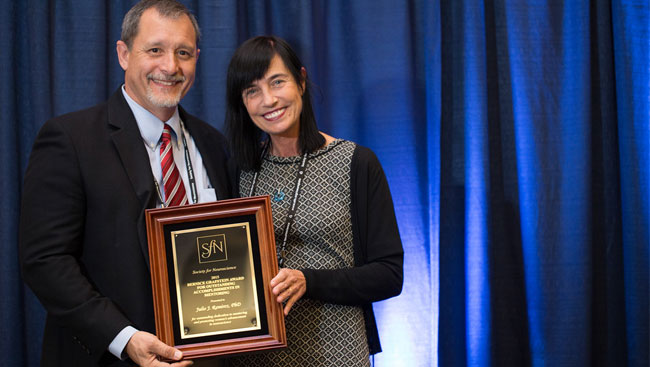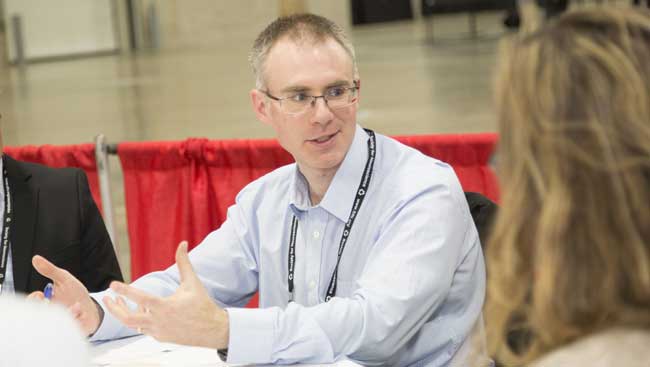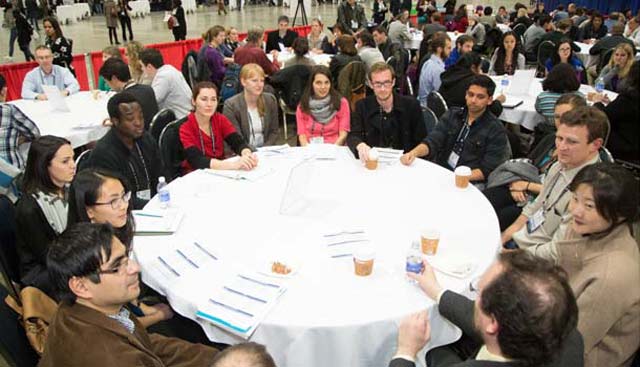On Leading Undergraduates to Discovery Through Mentorship
- Featured in:
- Best Practices for Mentoring Relationships

Mentoring advances the field of neuroscience by ensuring that trainees begin their careers with the necessary skills, scientific understanding, and other support to achieve success. Julio Ramirez, professor and chair of the psychology department at Davidson College, is leading efforts to improve mentoring for undergraduates studying neuroscience. He received the Bernice Grafstein Award for Outstanding Accomplishments in Mentoring in 2015 for his contributions. Here, Ramirez discusses his mentoring approach.
When you first became a mentor, what concerns or challenges did you have, and how did you work through them?
In the late 1970s and early 1980s, undergraduate students were not widely involved in original research projects across the life sciences. Funding sources to support undergraduate research were very limited, and undergraduate research was a foreign concept at many institutions. Laboratories at predominantly undergraduate institutions (PUIs) were not well outfitted with research-level equipment and technology. Many PUIs did not have curricular mechanisms that would enable undergraduates to get involved in research or reward mechanisms for supporting faculty efforts to involve students in original research.
Fortunately, several events occurred during that period that dramatically improved the outlook for undergraduate research at PUIs across the country. First, the Council on Undergraduate Research was established in 1978 and began advocating for original undergraduate research at PUIs. In the mid-1980s, both the NSF and the NIH implemented research and/or education grant programs for faculty and students at PUIs.
Many of my efforts during those years focused on contributing to the national efforts to create an infrastructure that would support undergraduate research at PUIs. In 1991, colleagues and I founded Faculty for Undergraduate Neuroscience to provide the neuroscience community with a voice representing the interests of faculty invested in using research to mentor their undergraduate students.
During my graduate work at Clark University, I began to experiment with integrating teaching and research when I asked several undergraduates to participate in my doctoral research. I was first exposed to this approach as an undergraduate at Fairfield University in Dr. Ronald Salafia’s laboratory. When I secured my first tenure track position at the College of St. Benedict, I invited several students to participate in my research program and I published our research findings with my students as coauthors. Subsequently, working in collaboration with my colleagues at Davidson College, I embarked on a mission to persuade colleagues and the administration that research could be used to educate and mentor students in the sciences. The success of our undergraduates in matriculating at outstanding graduate and medical schools, as well as their productivity in terms of publications and presentations, persuaded the Davidson community that integrating teaching and research was an excellent way to propel students to greater academic and personal achievement.
You’ve mentored more than a hundred students, many of whom are women and underrepresented minorities. What common issues or questions do your students grapple with?
Purpose in one’s life. Undergraduates are on the cusp of adulthood and full-fledged independence, and on the cusp of the responsibilities that come along with this passage. The future is rife with possibilities upon graduation, but some fear the unknown. That fear may undermine their efforts to take full advantage of the possibilities ahead. For some members of underrepresented groups and first generation college students, this apprehension may be especially acute. I have found that discussions (within a safe mentoring environment) centered on candid reflections on their life’s journey, aspirations, and dreams help them overcome their fears. My mentees often come to appreciate that they have the initiative and talent to make substantive contributions to society. Ultimately, one of my principal responsibilities is to help my students transform their inchoate passion into action for realizing a purposeful and productive life.
In developing students, you champion critical thinking, creativity, and compassion. What do these traits mean in the context of the lab, and what helps students strengthen them?
Engaging students in original scientific research is an extraordinarily effective way to promote critical and creative thinking. As we help transition our students from a neophyte’s understanding of neuroscientific phenomena and principles to a more sophisticated appreciation for the nuances of the scientific journey, we actively promote the development of critical and creative thinking. Learning how to read, dissect, and critically assess the primary scientific literature, as well as learning and exercising elements that go into rigorous design and execution of experimentation, lie at the heart of science education. Generating testable scientific hypotheses, designing and conducting experiments, troubleshooting technology, and interpreting and communicating scientific findings are all exercises in creativity. If engaging undergraduate students in thesis research or independent study is not possible, then crafting courses that emphasize inquiry-based learning is important to promote creativity.
We in the neurosciences are fortunate to work in a realm in which compassion often drives our quest to promote recovery from nervous system injury and cure neurodegenerative diseases. I introduce my students to examples of individuals who confront nervous system illnesses or trauma with video clips and visits to a local medical center in which we go on rounds with an attending neurologist so students may come to understand the far-reaching emotional costs of the illnesses they are studying. I also encourage my students to engage in activities in the community, such as bringing neuroscience to schools and volunteering in a local care-facility for victims of brain injury.
My reason for fostering critical thinking, creativity, and compassion in my courses and my laboratory is to prepare my students intellectually and to inspire them to make this world a better place for all of humanity.
What’s been the most rewarding experience for you as a mentor?
Witnessing the growth in my mentees as they undergo the transformation from unsure novice to confident young scientist. As my mentees move from the classroom into my laboratory, they evolve intellectually from a trepidation at pronouncing neuroscientific terminology to a point where they are full contributors to our research enterprise. By senior year, my mentees help design experiments and make significant contributions to the assessment, interpretation, and communication of our findings.
The bittersweet moments when my mentees graduate from Davidson and begin their independent journeys to discovery are among the most gratifying aspects of my career. The discovery that I am referring to is not only that which they experience as scientists, but also the discovery they experience as they enter adulthood — of their own paths to personal fulfillment in which they can make meaningful contributions to society.
Speaker









